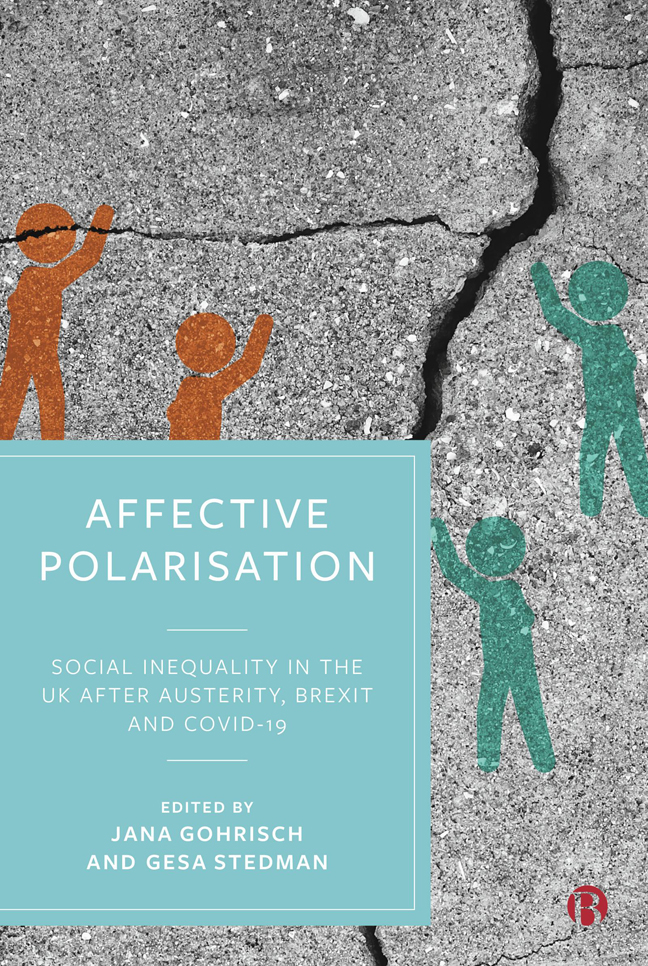Book contents
- Frontmatter
- Contents
- List of Figures, Tables and Boxes
- Notes on Contributors
- Acknowledgements
- Introduction
- 1 The Divided Left in the UK: Partisanship, Ideology and Class after Brexit
- 2 Populism and the People: Elitism, Authoritarianism and Libertarianism
- 3 ‘Coloring the Utterance with Some Kind of Perceivable Affect’: Constructing ‘Country’ and ‘People’ in Speeches by Theresa May and Boris Johnson – A Linguistic Perspective
- 4 The Challenges of Polarisation: Lessons for (Re-)Politicising Inequality across Four English Towns
- 5 “Go Away, But Don't Leave Us”: Affective Polarisation and the Precarisation of Romanian Essential Workers in the UK
- 6 Racialised Affective Polarisation in the UK
- 7 “Now You Have to Listen”: A Historical Analysis of Britain’s Left-Behind Communities
- 8 Britain in a State of Emergency: Studying Ken Loach's Films I, Daniel Blake (2016) and Sorry We Missed You (2019)
- 9 Cloaking Class: Making the Working Class Visible
- 10 Class, Poverty and Inequality in Scotland: Independence and the Creation of Affective Polarisations
- 11 Language and Identity: The Taliesin Tradition
- Conclusion
- Index
Conclusion
Published online by Cambridge University Press: 23 January 2024
- Frontmatter
- Contents
- List of Figures, Tables and Boxes
- Notes on Contributors
- Acknowledgements
- Introduction
- 1 The Divided Left in the UK: Partisanship, Ideology and Class after Brexit
- 2 Populism and the People: Elitism, Authoritarianism and Libertarianism
- 3 ‘Coloring the Utterance with Some Kind of Perceivable Affect’: Constructing ‘Country’ and ‘People’ in Speeches by Theresa May and Boris Johnson – A Linguistic Perspective
- 4 The Challenges of Polarisation: Lessons for (Re-)Politicising Inequality across Four English Towns
- 5 “Go Away, But Don't Leave Us”: Affective Polarisation and the Precarisation of Romanian Essential Workers in the UK
- 6 Racialised Affective Polarisation in the UK
- 7 “Now You Have to Listen”: A Historical Analysis of Britain’s Left-Behind Communities
- 8 Britain in a State of Emergency: Studying Ken Loach's Films I, Daniel Blake (2016) and Sorry We Missed You (2019)
- 9 Cloaking Class: Making the Working Class Visible
- 10 Class, Poverty and Inequality in Scotland: Independence and the Creation of Affective Polarisations
- 11 Language and Identity: The Taliesin Tradition
- Conclusion
- Index
Summary
During the summer of 2022, in the midst of the war in Ukraine, with the obvious signs of a new crisis developing in the UK (and elsewhere) as a consequence of the war, delivery chain problems and economic upheaval in different parts of the world, the then prime minister, Boris Johnson, gave an interview to foreign newspapers, including the German broadsheet Süddeutsche Zeitung. Rather than commenting on his own political future (decided shortly afterwards) or on domestic issues, Johnson focused entirely on foreign policy and on the alleged successes of his government and the relevance of Britain in a global context (Neudecker, 2022).
What sounded like a political utopia, or a deliberate refusal to face up to reality, provoked a written response in the same newspaper, penned by the writer and political satirist A.L. Kennedy (Kennedy, 2022a). In contrast to the utopian discourse of Britain's global political and general economic power, reflecting well on the then prime minister, Kennedy develops a dystopian vision of a UK on the brink of collapse. The same discursive pattern reoccurred shortly after Liz Truss became prime minister and following the death of Queen Elizabeth II. While Liz Truss publicly insisted on tax cuts leading to economic growth, A.L. Kennedy was driven to even greater dystopian despair in her subsequent satirical take on the downward spiral which the UK seems to have taken with an ever-deepening cost-ofliving crisis, political turmoil and economic uncertainty for the majority of Britons (Kennedy, 2022b). While there is good reason, according to leading economists and institutions, to fear Liz Truss’ economic policies (Partington, 2022), which make Kennedy's satirical future look realistic rather than dystopian, meaning that the consequences of Conservative government decisions do not belong to the realm of negative fantasy, it is obvious that both the utopian and the dystopian model of Britain during a time of crisis is built on radical disparity which might, in turn, further encourage affective polarisation.
While the tradition of political satire is, of course, built on pinpointing and sharpening conflict and points of difference, government policy might be expected to address not just a minority of a country's inhabitants, but rather the majority. This does not seem to be the case any longer in Britain, with even Johnson's seemingly ineffective ‘levelling up’ programme finally discarded by his successor.
- Type
- Chapter
- Information
- Affective PolarisationSocial Inequality in the UK after Austerity, Brexit and COVID-19, pp. 233 - 237Publisher: Bristol University PressPrint publication year: 2023

